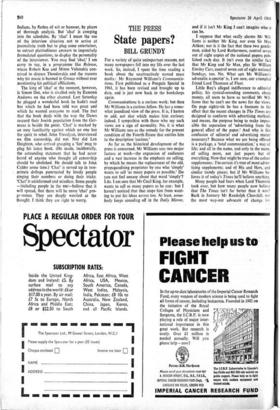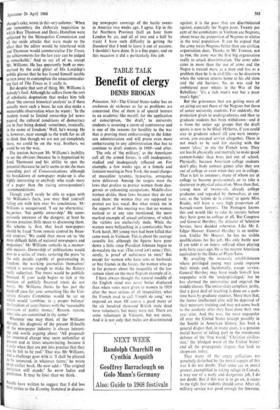State papers?
THE PRESS BILL GRUNDY
For a variety of quite unimportant reasons, not many newspapers fell into my life over the last week. So, instead, I spent the time reading a book about the unattractively named mass media : Mr Raymond Williams's Communica- tions. First published as a Penguin Special in 1961, it has been revised and brought up to date, and is just now back in the bookshops again.
Communications is a curious work; but then Mr Williams is a curious fellow. He has a some- what jaundiced view of the press. It is, I hasten to add, not that which makes him curious; indeed, I sympathise with those who say such views are a sign of normality. No, it is what Mr Williams sees as the remedy for the present condition of the Fourth Estate that entitles him to the description 'curious.'
As far as the historical development of the press is concerned, Mr Williams sees two major factors at work—the expansion of audiences and a vast increase in the emphasis on selling, by which he means the replacement of the old, propagandising proprietor by one who 'simply' wants to sell 'as many papers as possible.' Do you not feel uneasy about that word 'simply'? I do. I am sure that Mr Cecil King, for example, wants to sell as many papers as he can : but I haven't noticed that that stops him from want- ing to put his ideas across too. At least, some- body keeps sounding off in the Daily Mirror,
and if it isn't Mr King I can't imagine who it can be.
I suppose that what really alarms Mr Wil- liams is neither Mr King, nor even Sir Max Aitken; nor is it the fact that these two gentle- men, aided by Lord Rothermere, control seven out of eight copies of the national papers pub- lished each day. It isn't even the similar fact that Mr King and Sir Max, plus Sir William Emsley Carr, control seven out of eight national Sundays, too. No. What sets Mr Williams's adrenalin a-spurtin' is, I am sure, our crumpled friend Lord Thomson of Fleet.
Little Roy's alleged indifference to editorial policy, his cynical-sounding comments about money, all seem to have so terrified Mr Wil- liams that he can't see the news for the views. On page eighty-six he has a footnote to the effect that the recent changes in The Times are designed to conform with advertising methods and means, the purpose being to make impos- sible the separation of 'advertising from the general effect of the paper.' And why is this confusion of editorial and advertising matter necessary? Because what we are being offered is a package, a 'total communication,' a way of life; and all in the name, and only in the name, of selling more, not just papers but of everything. Now that might be true of the colour supplements : I'm certain it's true of most adver- tising supplements; and of His and Hers, and similar trendy pieces; but if Mr Williams be- lieves it of today's Times he'll believe anything.
Many people had fears when Lord Thomson took over, but how many people now believe that The Times isn't far better than it was? Back in January Mr Randolph Churchill. not the most way-out advocate of change for
change's sake, wrote in this very column : `When one remembers the elaborate inquisition to which Roy Thomson and Denis Hamilton were subjected by the Monopolies Commission and all the snide attacks that were made to the effect that the editor would be interfered with and Thomson would commercialise The Times, the achievements for the last year can be judged as remarkable.' And so say all of us, except Mr. Williams- He has apparently bee!) so mes- merised by the cold glitter of His Lordship's pebble glasses that he has found himself unable to turn away to contemplate the unaccommodat- ing fact of The Times as it really is.
But despite that sort of thing, Mr. Williams is nobody's fool. Although he suffers from the sort of scholastic dogmatism that makes him talk about `the correct historical analysis' as if there actually were such a beast, he can also make a memorable observation when he wants: 'In the modern trend to limited ownership [of news- papers] the cultural conditions of democracy are in fact being denied; sometimes, ironically, in the name of freedom.' Well, he's wrong. He is, however, near enough to the truth for us all to think that though we are not yet completely there, we could be on the way, brothers, we could be on the way.
The tension between Mr Williams's inability to see the obvious (because he is hypnotised by Lord Thomson) and his ability to spot the potential (because he isn't) seems to me the most rewarding part of Communications, although his breakdown of newspaper make-up is also highly interesting to anybody who reads more of a paper than the racing correspondent's recommendations.
Though you'll rarely be able to argue with Mr. Williams's facts, you may find yourself falling out with him over his conclusions. Mr Williams is unequivocal. 'I see no alternative; hewrites, 'but public ownership: He seems curiously unaware of the dangers; at least he devotes precious little space to discussing them. His scheme is, first, that local newspapers should be freed 'from remote control by finan- cial empires.' We could then move on to 'the more difficult fields of national newspapers and magazines,' Mt Williams remarks in a memor- able meiosis. Ownership of publications would pass to a series of trusts, restoring the press `to the only people capable of guaranteeing its freedom: the working journalists themselves' (which is untrue enough to make the flattery really seductive). The trusts would be publicly financed. If your scalp begins to itch at the mention of publicly financed trusts do not worry. Mr Williams thinks he has just the dandruff cure for you; something like the Uni- versity Grants Committee would be set up which would 'combine, in a proper balance' the freedom of contributors with the 'reasonable provision of public money.' Reason, reason, what sins are committed in thy name!
Whatever one may think of the Williams therapy, his diagnosis of the present ill-health of the newspaper industry is always interest- ing and worth arguing about. 'All proposals for structural change may seem unfamiliar at present and at times unconvincing, because it is only when they are put into practice that they can be felt to be real.' That was Mr Williams, and a challenge goes with it. 'I shall be pleased to be answered, in whatever terms,' he wrote in an earlier book. He now adds: 'The original invitation still stands.' So RSVP ladies and gentlemen. It may be later than we think.
People have written to suggest that I did less than justice to the Evening Standard in discuss- ing newspaper coverage of the hectic events in America two weeks ago. I agree. Up in the far Northern Province (half an hour from London by air, and all of two and a half by train) I have such difficulty in getting the Standard that I tend to leave it out of account. I shouldn't have done. It is a fine paper, and on this occasion it did a particularly fine job.







































 Previous page
Previous page